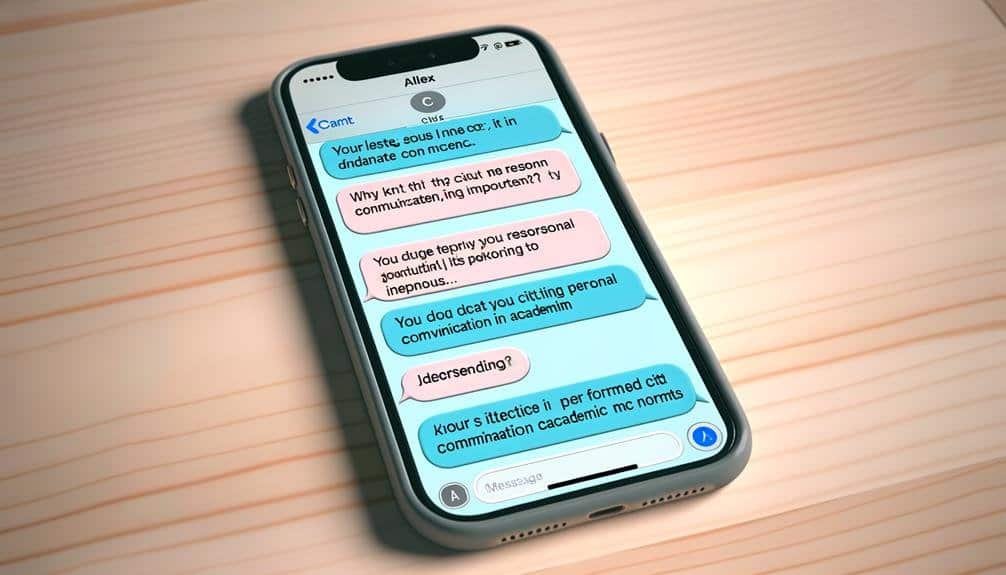How to Cite Personal Communication?
Did you know that citing personal communication is an essential part of academic writing? It's not just about citing books or articles, but also about acknowledging the valuable information you may have obtained from conversations, interviews, or emails with experts in the field.
Knowing how to properly cite personal communication can strengthen your arguments and add credibility to your work. So, if you want to ensure that your research is accurate and reliable, it's crucial to understand the rules and guidelines for citing personal communication.
Stay tuned to discover the different types of personal communication, in-text citation methods, and how to format your references correctly.
Key Takeaways
- Personal communication is essential for expression, information sharing, and relationship building.
- Ethical considerations, such as respecting boundaries, maintaining confidentiality, and striving for fairness and inclusivity, should be taken into account in personal communication.
- Different types of personal communication, such as in-person conversations, phone calls, emails, and text messages, require different citation methods.
- In-text citations and formatting references for personal communication are important for establishing credibility, giving credit to individuals, and allowing readers to verify information.
Understanding Personal Communication
To truly understand personal communication, it's essential to delve into the intricacies of human interaction and the various factors that contribute to effective and meaningful connections between individuals. Personal communication plays a crucial role in our lives, as it allows us to express ourselves, share information, and build relationships. It enables us to connect on a deeper level, fostering understanding and empathy.
Moreover, personal communication helps us navigate through various social contexts, adapting our communication style to suit different situations.
Ethical considerations also come into play in personal communication. It's important to be mindful of the impact our words and actions can have on others. Respecting boundaries, maintaining confidentiality, and being honest and transparent are all crucial aspects of ethical communication. Additionally, considering the power dynamics in our interactions and striving for fairness and inclusivity is essential.
Types of Personal Communication
There are several distinct types of personal communication that play a significant role in our daily interactions and relationships. Understanding these different types is crucial when it comes to citing personal communication effectively. Here are three common types of personal communication and their importance:
- In-Person Conversations: Face-to-face interactions allow for immediate feedback and a deeper understanding of the message. These conversations are vital for building trust and fostering meaningful connections.
- Phone Calls: Despite the rise of digital communication, phone calls remain an essential form of personal communication. They enable real-time conversations and convey emotions more effectively than written messages.
- Emails and Text Messages: Written communication through emails and text messages provides a convenient way to communicate quickly and efficiently. They're often used for professional communication and provide a record of the conversation.
Ethical considerations in personal communication citation include obtaining consent from the individual, respecting their privacy, and ensuring accuracy and fairness in representing their words or ideas.
In-Text Citations for Personal Communication
When citing personal communication in your writing, it is important to use in-text citations to give credit to the individuals involved and provide readers with the necessary information to locate the source. In-text citations for personal communication typically include the name of the person, the medium of communication, and the date of the communication. This helps to establish the credibility of your work and allows readers to verify the information if needed. It is also essential to consider the ethical considerations in personal communication citing. Always obtain permission from the individual before citing personal communication and ensure that any confidential or sensitive information is appropriately redacted or anonymized. Respecting privacy and maintaining confidentiality are crucial when citing personal communication.
| Key Components of In-Text Citations for Personal Communication | |
|---|---|
| Name of the person | Medium of communication |
| Date of the communication |
Formatting References for Personal Communication
Formatting references for personal communication requires careful attention to detail and adherence to specific citation guidelines. When citing conversations or referencing interviews in your research, it's important to provide accurate and complete information to ensure proper acknowledgement of the sources.
Here are three key points to consider:
- Include the full name of the person you communicated with, along with their professional title or affiliation.
- Specify the date of the communication, including the day, month, and year.
- Clearly state the medium of communication, such as personal interview, telephone conversation, or email correspondence.
Examples of Personal Communication Citations
To properly format your references for personal communication, it is important to understand how to cite different types of conversations and interviews. Personal communication can include emails, phone calls, interviews, and even text messages. When citing personal communication, it is essential to provide as much information as possible to allow others to locate the source. Here are some examples of citation formats for personal communication:
| Type of Communication | Format |
|---|---|
| (Sender's Last Name, personal communication, Date) | |
| Phone Call | (Caller's Last Name, personal communication, Date) |
| Interview | (Interviewee's Last Name, personal communication, Date) |
Citing personal communication is important because it adds credibility to your work and allows readers to verify the information you have used. It also respects the privacy and consent of the individuals involved in the communication. By following proper citation formats, you demonstrate academic integrity and give credit to the original sources of your information.
Conclusion
In conclusion, citing personal communication is essential for providing accurate and reliable information in academic writing. Understanding the different types of personal communication and using proper in-text citations and reference formatting is crucial.
By investigating the truth of a theory and incorporating it into our writing, we can enhance the depth and complexity of our work. Writing in a knowledgeable, detail-oriented, and thorough style ensures that our readers receive comprehensive and credible information.







